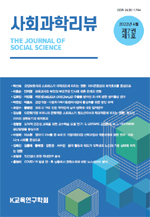본 연구의 목적은 독거노인의 디지털 사회자본과 삶의 만족도 관계에서 사회적 고립감의 매개효과를 검증하는 데 있다. 이를 위해 전북특별자치도 내 거주하는 60세 이상노인 500명을 대상으로 설문조사를 실시하고, 회수된 응답 중 결측 및 불성실한 응답과연구대상이 아닌 비독거노인을 제외한 독거노인 194명의 응답을 SPSS 26.0 프로그램의Process Macro v4.2, Model 4로 위계적 회귀분석과 부트스트래핑을 통한 매개효과를 검증하였다. 주요 결과는 다음과 같다. 첫째, 독거노인의 디지털 사회자본이 증가할수록 삶의 만족도가 증가하는 것으로 나타났다. 둘째, 독거노인의 디지털 사회자본이 증가할 때사회적 고립감이 감소하는 것으로 나타났다. 셋째, 독거노인의 사회적 고립감이 증가할수록 삶의 만족도가 감소하는 것으로 나타났다. 넷째, 독거노인의 사회적 고립감은 디지털사회자본이 삶의 만족도에 미치는 영향 관계를 부분 매개하는 것으로 검증되었다. 이러한결과를 바탕으로 독거노인의 삶의 만족도 향상을 위한 개선 방안 및 디지털 사회자본의향상과 사회적 고립감 감소를 위한 실천적, 정책적 방안 등을 제시하였다.
The aim of this research is to investigate the role of social isolation as a mediator in the association between digital social capital and life satisfaction inolder adults living alone. A survey was conducted with 500 individuals aged 60 andover residing in Jeonbuk Special Self-Governing Province, South Korea. Among theresponses collected, a total of 194 valid responses from older adults living alonewere analyzed, excluding incomplete, insincere, or ineligible responses. Hierarchicalregression analysis and bootstrapping were performed using SPSS 26.0 and ProcessMacro v4.2 (Model 4) to test the mediating effect. The key findings are as follows:First, higher levels of digital social capital were significantly associated withincreased life satisfaction. Second, digital social capital was negatively associatedwith social isolation. Third, social isolation had a significant negative impact on lifesatisfaction. Fourth, social isolation was found to partially mediate the relationshipbetween digital social capital and life satisfaction. Based on these findings, thestudy proposes practical and policy implications aimed at enhancing digital socialcapital and reducing social isolation as strategies to improve the life satisfaction ofolder adults living alone.
Ⅰ. 서 론
Ⅱ. 이론적 배경
Ⅲ. 연구방법
Ⅳ. 연구결과
Ⅴ. 결론 및 제언
참고문헌
(0)
(0)
